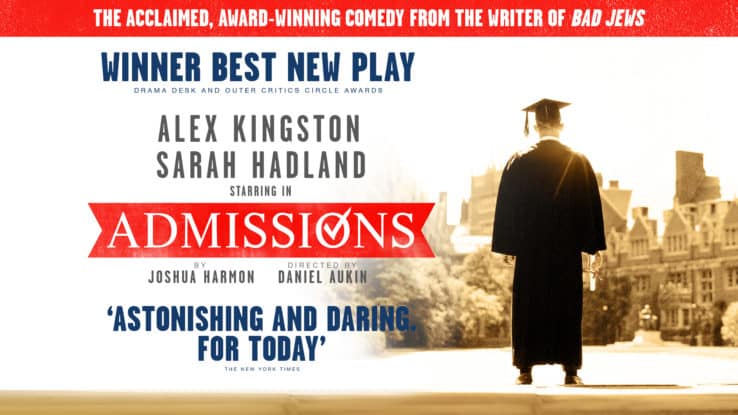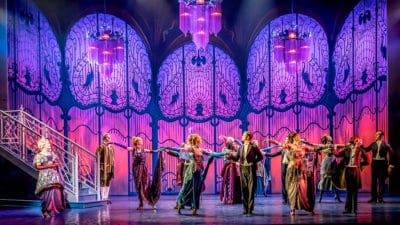Theatre

Interview
The cast of Admissions on the West End play
Watch and read more, as Admissions runs at London's Trafalgar Studio 1.
Admissions, a funny and biting new play by Joshua Harmon – who wrote the hit dark comedy Bad Jews – has crossed the pond, transferring from the Lincoln Centre Theater to London’s Trafalgar Studios.
Directed by Daniel Aukin, Admissions is about much more than getting into the university of your choice. The story follows Sherri, the progressive head of admissions at an elite private school who’s been actively trying to diversify the student population. However, her personal agenda is suddenly called into question when her son doesn’t make the cut at his desired university – but his best friend who “ticks more boxes” does.
Starring in Admissions in the role of Sherri is Alex Kingston. Everyone knows her from TV series like ER and Doctor Who, plus she’s recently been seen on Sky One’s hit supernatural romance A Discovery of Witches – adapted from the novel by Deborah Harkness. Kingston also boasts a lengthy list of stage credits having performed in Friedrich Schiller’s Luise Miller as well as in Darwin’s Flood, Othello, A Midsummer Night’s Dream and MacBeth.
Sarah Hadland plays Ginnie, the mother of Sherri’s son’s best friend. Hadland is everybody’s favourite friend Stevie from the BAFTA-nominated sitcom Miranda. She too is no stranger to the stage with credits including Who’s Afraid of Virginia Woolf?, Grease, Time and the Conways and most recently What’s in a Name?. Hadland has also appeared on screen opposite Daniel Craig in 2008’s James Bond film Quantum of Solace.
We recently caught up with Alex and Sarah to find out how they’re finding their roles.
How are you finding the experience of starring in Admissions so far?
Alex: It is a very collaborative experience- there are only 5 of us and we all get on really well together which is just as well because the dialogue goes at quite a lick, like a fast-paced ball-game –you have to be on your toes – so it’s great that we’ve gelled and we’re all very supportive of each other.
Sarah: I am loving being part of this amazing play Admissions, from the moment I read Joshua’s brilliant script I knew I wanted to be involved.
What has surprised you most about being involved in the play?
Alex: How much the play is mirroring current events especially in the wake of the US university admissions scandal. The play is beautifully written- It’s funny and sharp and moves along at breakneck speed. The concept around Admissions is such a hot topic in real life and top universities really are being encouraged to be more open to people from diverse backgrounds and cultures. The play opens a necessary debate and will lead to conversations about how people deal with diversity. My character, Sherri is really proud to be dedicated to promoting diversity but the play also raises some big, challenging and uncomfortable questions. It’s brilliant for the audience to watch these characters wrestle with very real-world problems which don’t necessarily have an answer.
How have you found the audience’s reaction?
Alex: It’s incredibly interesting to see how different audiences react. Sometimes we will get spontaneous applause at the end of a particular speech and other times we get gasps and a sense of ‘oh I can’t believe he just said that’. It’s humour, but it’s dark humour. The audience gets taken on a ride of changing opinions and their reactions to the action on stage really do function as an extra cast member.
Sarah: When Alex and I started to do interviews during rehearsals we were concerned that we were constantly being asked about the comedy element of the show. I think after the first week of rehearsals we became so invested in our characters’ perspectives that we forgot it was funny! So when we did our first preview and the audience were almost raucous in their response we were a bit shocked! Of course, the brilliance of the writing is such that one minute the audience will belly laughing and even applauding a line only to be stunned into silence the next or quite often there will be gasps of horror.
How do you think your understanding of your character has developed since the production began?
Sarah: What really drew me to Ginnie was portraying a mother of a biracial child, the breaking down of a relationship with a friend who she believes has always treated her and son as equals. Diversity and race are such big issues in the world and to explore this through a lifelong friendship was very interesting to me.
Our incredible director Daniel Aukin made a point of speaking to us about our character and their motives/perspectives individually so the other actors weren’t allowed to hear. This meant you only ever considered your point of view – you were the only party to information your character would have been aware of. This technique helped us to be very focused on our own journey as we all are in life and genuinely affected by others actions/behaviour.
What do you think makes Admissions so special?
Alex: The play is incredibly multifaceted- It’s not just about race and diversity, it’s about maternal instinct, parents and families. Sherri utterly believes that what she is doing is right until her white son, who is competing with his black friend, loses out on his longed-for acceptance to Yale and her liberal views are challenged. Everyone wants their children to excel. It’s fascinating because you start off agreeing with one viewpoint but as the play progresses it challenges your thought processes and you get to a point where you’re saying ‘Oh no, I don’t agree with that. That’s not fair’. It’s not a simple debate; it has many layers but it will definitely provoke conversation. It’s as if the first act is the play and the second act is the conversation the audience has afterwards.
Sarah: To be part of a play that is so challenging in the questions that it asks of the audience whilst also making them laugh out loud is very exciting. I feel very lucky to be in it.
Andrew Wooddall appears as Bill, Sherri’s husband and the liberal headmaster, and Margot Leicester as Roberta, an administrator at the school. Ben Edelman has also reprised his role as Sherri’s son Charlie, having first performed it in the Lincoln Centre Theater production where he received rave reviews.
Admissions has won the Drama Desk and Outer Critics Circle Awards for Best Play. In addition, it’s been lauded by an array of critics. Read our interview with Ben, Margo, Andrew and director Daniel below.
How would you describe what Admissions is about?
Ben Edelman: What Admissions is about is really up to you, as the audience. There are a lot of things that get discussed, that get brought up, that are not said as well, but are in the negative space of the drama. Also, of course, it’s about admissions in the literal sense, to college or university, and it’s also about race, class, education, and more broadly family, friendship, privilege, dreams, heartbreak, the politicization of life, which is both very real and necessary and also very difficult and messy to actually live with ands not just abstractly deal with. And that’s kind of the exciting part, that really it’s a clash of things that are always present but also sort of distant.
Margo Leister: It’s about two families who are going through all the choices and decisions you have to make when you want to do the best for your children and do good in the world at the same time. And for us, that takes the form of an educational establishment – so it’s very much the educational, the social, the political choices you make, sort of on behalf of your children, and all the contractions that arise and stop you from being the great people you really wish you could be.
Andrew Woodall: And then subtly it also deals with racism, how white liberals deal with racism, and that very much becomes one of the major themes of the play. It just does it a very subtle and a witty kind of way.
And one of things that’s so striking about the play is how funny it is, despite dealing with these pretty heavy, deeply effecting themes you’ve mentioned.
Daniel Aukin: You know, Josh’s writing is so strong that actually we’re not talking about the humour at all when we’re working on it, and in fact I’ve done three of Josh’s plays and some of the best performances of those works have been where audience didn’t laugh – even though they were all marketed as comedies. Because the humour comes out of something very serious it’s being figured out and wrestled with; so, there’s a fine balance where sometimes the audience will laugh at that and sometimes they won’t. But it exceptionally witty, the work.
AW: Yes, he’s taken a serious subject and he’s made a choice that means as a piece it doesn’t whack you over the head with those themes, but instead comes at it tangentially; and it has an arc to it, so the play sort of has a resolution that in some ways is quite uncomfortable.
BE: And on that note, I think Josh is a marvellous writer. What makes it so funny and witty and dramatic is how it becomes all of those things. He’s really able to create such complicated, relatable and often repulsive characters and situations and it’s unbelievable.
And so Daniel, as director, you’ve actually worked on the play before in New York. How is it now being able to revisit it in this way?
DA: It’s really a joy for lots of reasons. One is that I just love this play! It’s also getting to do it with a completely new cast, in a completely different kind of space, with a completely new design team, and also the first time you direct a world premiere of a play very often the playwright is bringing in changes every day and there’s a certain joy and adrenaline rush to that, but it’s actually really exciting to get to work on it when there isn’t changes coming every day and you’ve just got the text and you know it works and you’re excited to explore that as a different experience.
And so tell us a little bit about the characters you play in Admissions?
ML: Well, I play Roberta who is a liberal of a previous generation to the rest of the characters we meet, and she’s sort of blindsided by their use of affirmative action – she’s sort of lost: she’s not intentionally racist in anyway but in this transition to get up to speed with diversity and inclusion, she becomes very comical in the play. But she’s also very vulnerable as she gets exposed as being a slightly more unpleasant person than what she thought herself to be.
AW: And I play Bill, I’m a headmaster, a headteacher, and I am super liberal. I am sort of rather pleased with how good I am, and I mean well but there’s a sort of dangerous arrogance about that which throughout the course of the play gets discovered. And my wife Sherri (Alex Kingston) and I have this very symbiotic relationship about how we do education and affirmative action, and then we have this boy, Charlie…
DA: He’s one of the starriest kids at his school… an academic high-flyer…
BE: 100%. Charlie is on the basketball team, does a million extra curriculars, takes three AP classes, is deeply invested in being a thoughtful student, in a way that is rare in high school no matter how prestigious, and in terms of the journey there is a lot to be said!
DA: So when faced with an obstacle, Charlie takes his parents’ progressive values to a conclusion that they did not anticipate and that causes an enormous explosion in their family.
You’ve told us a little bit about what the play is about, but if you had sum up what audiences can expect from Admissions in just a few words, what would they be?
DA: A brilliantly funny explosive evening.
BE: They can expect to walk away being forced to confront certain things.
ML: It will be engaging with people’s thoughts and feelings that they’re having now; questions that are raised for them, decisions that they are not sure about and I really think it will speak to all of that.
AW: And it’s entertaining! It’s amusing, it’s thought-provoking, it’s stimulating; and people want that.
DA: I honestly believe it is one of the more astonishing pieces of writing that I’ve not only worked but come across in any form in the last decade or so. It’s speaking to a lot of difficult issues in a really honest way.
BE: I think art and theatre do primarily do things: one is a form of escapism and fantasy, and one is a form of activation of what is already going on in one’s life; and I think this play does both – it really takes certain things that feel so far away from actually being expressing or inspected and brings them right up to the front, which is so unusual to experience; and in doing that, it’s really investigating things which are highly relatable and relevant, so I think people can expect to have the air really knocked out of them.
Tickets for Admissions in the West End are available now at Ticketmaster.co.uk.









